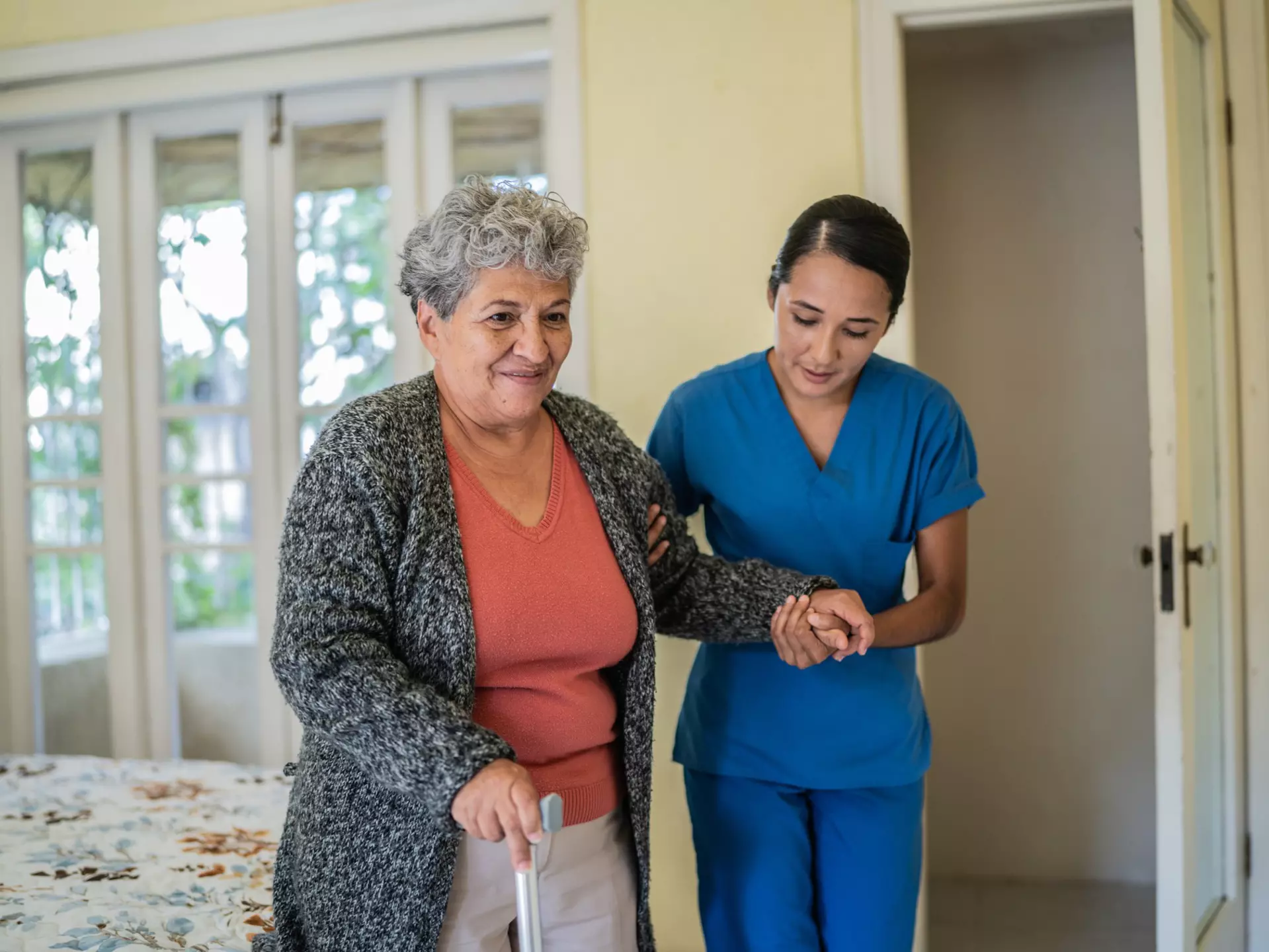If you are considering additional help for yourself or someone you love, it’s helpful to understand all the available options. In many cases, support services may be provided on a short-term or long-term basis, depending on what’s needed.
In this blog, we’ll discuss short-term support, including common types and how to choose the option that best fits your or your family member’s unique needs and circumstances.
What Is Short-Term Support and When Is It Needed?
Short-term support is typically provided for a limited period, usually a few days, weeks, or even months. In contrast, long-term support services are designed to provide ongoing support for several months or years. Both options are beneficial, but choosing between them depends on the specific needs of you or your loved one.
Let’s look at a few situations where short-term support may be the better fit:
- Recovering After Surgery or Hospitalization: If you or someone you love had surgery, such as a hip or knee replacement, or a recent hospital stay, short-term support services can provide important services, including physical therapy, assistance with activities of daily living (ADLs), and medication management to support the recovery process.
- Relief for a Family Caregiver: While caring for an aging parent can be deeply rewarding, the daily responsibilities can sometimes feel overwhelming. In these moments, short-term support services can provide the support your loved one needs, giving you time to recharge or focus on other responsibilities.
- Understanding if a Senior Living Community Is the Right Fit: Sometimes, the best way to get a true feel for a community is to experience it firsthand. When exploring your options, ask if they offer short-term assisted living. This can be a great way to see what it’s like to live there before committing.
- Transition to Assisted Living: If you or someone you love could benefit from additional support but aren’t quite ready to move into a community full-time, short-term assisted living services can provide the right support for your needs as you consider your next steps.

Common Types of Short-Term Support Options for Seniors
Many short-term support options are designed to offer specific services for residents with a wide range of needs.
Here are some of the most common options you may come across:
Respite Support Services
Respite support services are designed to support a person’s needs while giving the family caregiver a chance to take a break, manage other responsibilities, or simply rest and recharge. They can also offer a refreshing change of routine, a new environment, and plenty of opportunities to socialize with fellow residents and other caregivers.
Here are some key services you may find in respite care:
- Grooming and personal care
- Assistance with activities of daily living (ADLs)
- Medication management
- Nursing services
- Meals and snacks
Families may arrange for respite support in various settings, like an assisted living or skilled nursing community. It usually lasts from a few days to a couple of weeks.
However, some communities may require a minimum stay, often between three and five days. The average cost ranges from $150 to $300 per day, depending on the specific community and the level of support required.
Rehabilitation Centers
In some cases, rehabilitation services may be necessary to recover after a hospital stay, surgery, or injury. Rehabilitation centers are designed to help residents safely return to their everyday lives by providing specialized services such as physical, occupational, or speech therapy, depending on what’s needed.
Stays are often temporary, usually lasting a few weeks to a couple of months, and are frequently prescribed by a doctor as part of a recovery plan. While prices vary, a typical stay may cost between $200 and $500 per day. In some cases, Medicare may help cover the cost if specific conditions are met.
Skilled Nursing
Skilled nursing services are ideal for someone who needs around-the-clock medical support to manage an illness or condition. For example, a person may need this type of support after a serious fall, injury, or emergency room visit. Skilled nursing is often recommended by a doctor and delivered by trained medical professionals when it’s not safe for the individual to return home.
These services typically include:
- Health assessments
- Medication, disease management, and education
- Physical, occupational, and speech therapy
- Diet and nutrition management
- Complex wound care and dressings
- The cost generally ranges from $250 to $500 per day. If medically necessary, Medicare or private insurance may cover the cost.

Adult Day Programs
Sometimes, it’s not possible to be there physically for our loved ones. Adult day care services can help provide temporary support for individuals during the day while caregivers attend to other responsibilities.
In addition to the necessary support, many programs offer transportation services, meals and snacks, and enjoyable activities to promote socialization and overall well-being.
However, they’re usually not equipped to provide specialized medical support and may not be suited to handle complex medical needs. Costs are generally between $75 and $125 per day, and some locations may offer financial assistance or accept Medicaid.
Short-Term Stays in Assisted Living Communities
If you or your loved one is curious about assisted living but not ready to commit, a short-term stay can be a great way to test the waters. These stays include meals, help with daily routines, and access to community activities. Some families also use short-term stays during recovery from a hospital visit or when a regular caregiver is away. Stays usually last from a week to several weeks, depending on the community’s policies and your personal needs. On average, these stays cost between $150 and $250 per day, and some communities offer bundled pricing or trial rates.
Hospice Support Services
Hospice services are designed to provide specialized services, including pain management and psychological support, to individuals facing untreatable medical conditions. The focus is primarily on relieving pain, managing symptoms, and reducing psychological stress while addressing the individual’s emotional, social, and spiritual needs.
While hospice is often associated with long-term care, it can also be used on a short-term basis, like when a family needs a few days of additional support or a temporary break from caregiving.
Hospice services may be provided at home or in a specialized community. While the costs may vary significantly due to several important factors, families expect to pay between $10,000 and $15,000 per month. In many cases, Medicare, Medicaid, or private insurance may help cover some or all hospice expenses.
Comparing Short-Term Support Services
Choosing the right short-term support service for your loved one can feel overwhelming, especially when there are so many options to consider. Each service offers a different level of support, cost, and setting. Understanding how they compare can help you make the decision that’s right for your family.
Below is a quick side-by-side comparison of the most common short-term support options:
| Service Type | Average Cost (per day) | Medical Oversight | Insurance Coverage | Best For |
|---|---|---|---|---|
| Adult Day Programs | $75–$125 | Low | Some Medicaid or assistance programs | Daytime support while the caregiver is at work or running errands |
| Respite Support Services | $150–$300 | Low to Moderatex | Sometimes (depends on the provider) | Family caregiver relief, short breaks, trial stays |
| Short-Term Assisted Living | $150–$250 | Moderate | Typically private pay | Trial stays, temporary support after hospital visit, or caregiver absence |
| Rehabilitation Centers | $200–$500 | High (includes therapy) | Often covered by Medicare | Post-surgery recovery, hospital discharge, and physical therapy |
| Skilled Nursing | $250–$500 | High (24/7 medical staff) | Often covered by Medicare/insurance | Complex health needs, recovery after ER visits, or serious illness/injury |
| Hospice (Short-Term or Respite) | $10,000–$15,000/month | High (specialized medical team) | Often covered by Medicare/Medicaid | End-of-life support, symptom relief, and caregiver relief for terminal illness |
How to Find and Choose the Right Short-Term Support Provider
When seeking short-term support options for yourself or a family member, it’s always helpful to know where to look and what questions to ask.
Where to Start Your Search
Trusted online resources, like Eldercare Locator and your local Area Agency on Aging, can help you narrow down options based on your needs and location.
Also, don’t hesitate to ask for referrals. Hospital discharge planners, social workers, or your doctor can often recommend reliable providers they’ve worked with before.

What to Look For and Questions to Ask
As you compare short-term support providers, keep an eye on the following:
- Are they properly licensed and certified?
- What is their employee-to-resident ratio during the day and night?
- Is the space clean, safe, and welcoming?
- Do they offer life-enriching programs and activities that suit your or your loved one’s interests?
- What do online reviews and family testimonials say about the experience?
- How are caregivers screened and trained? Are they bonded and insured?
- How is a personalized support plan created and updated?
- Are there any red flags in the contract, like hidden fees or vague terms?
Is Long-Term Support an Option for Your Loved One?
Short-term support services allow individuals to safely return to their everyday lives after their condition has improved. If you or a family member could benefit from daily support, then it might be worth looking into available long-term support options. Unlike short-term services, long-term support is designed to provide consistent, everyday help based on ongoing needs.
At StoryPoint Group communities, we understand that no two people are alike. That’s why we take the time to get to know each resident personally to help them make the most of each day.
Some of our long-term support services include:
- Independent living
- Enhanced living
- Assisted living
- Memory care
- Respite care
- Skilled nursing
Let StoryPoint Group Be Your Guide
At StoryPoint Group communities, we understand the many challenges seniors and their families often face when finding the right support services.
If you or someone you love could benefit from extra support, we’re here to help guide you every step of the way.
To learn more about life in our communities or just say hello, contact us or call us at 1-844-275-9990. We can’t wait to get to know you!













